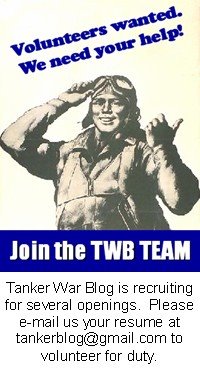 It seems as though another day or two will pass before the release of the public version of the GAO tanker Decision. We have been told by several sources that the Decision is either 67 or 69 pages long. (We suppose some are counting the cover or blank page or two.)
It seems as though another day or two will pass before the release of the public version of the GAO tanker Decision. We have been told by several sources that the Decision is either 67 or 69 pages long. (We suppose some are counting the cover or blank page or two.)We have held off commenting extensively on the GAO statement regarding the bid protest decision until we get a chance to look at the report, even if major portions are reacted, but here are some areas we feel our readers should be aware of:
1) The GAO statement does not mention fuel usage differences and the Air Force's use of them in determining life cycle costs. This was a an issue Boeing's strenuously raised, so it will be interesting to see how the GAO ruled on that issue.
2) The GAO statement does not mention the Air Force's use as a discriminator of the KC-30 exceeding key performance parameter objects in medevac capacity, passenger carrying or cargo hauling. The GOA reason #2 only mentions aerial refueling.
3) The GAO statement seems to say that, contrary to the KC-30 team's many claims, the A330 tanker can not refuel the V-22. (See reason #3) If so, we would offer the numerous naysayers who hurled insults/false accusation against TWB for stating just this in March, to feel free to use the comments section to make your apology. If we turn out to be wrong on this, we will be sure to apologize to the KC-30 team.(Don't worry SMSGT MAC, we exempt you from having to admit any mistake ever.)
4) Lastly, in the GAO reason #7 for sustaining the protest, it mentions that the Air Force improperly increased Boeing's estimated non-recurring engineering costs. No mention was made of the recurring costs.
There are a number of other issues, such as the findings on the use/misuse of the IFARA and the CMARPS model, that we will be looking for but the above list is a good start.




 Stumble It!
Stumble It!
5 comments:
Crucially, would the outcome of the competition have been different if the GAO findings had been taken into account by the USAF prior to announing the winner? i.e., would Boeing have won it?
This is a question which nobody seems willing to answer at the moment.
While it is not clear that Boeing would have "won" it, it is readily apparent that Airbus would have lost it. They didn't bother to even put in one mandatory item.
Additionally, the RFP was for a MEDIUM sized tanker for good reason. The A330 derivative would actually be bigger than the current KC-10A, which is already too big for a lot of forward deployment bases.
It would not be possible for AirBus to win or lose it was between Boeing and Northrop or should we start saying Boeing/the Japan firm that builds the tail section?
After reading the GAO's redacted decision document...I am stunned. The Air Force awarded the contract to NG/EADS despite their proposal being non-compliant on 2...that's TWO...separate items mandatory under the RFP. Organic Depot Maintenance within 2 years and the ability to refuel all current receiver aircraft using current Air Force procedures. Even if NG/EADS decided to comply with Depot Maintenance, the fact remains that the A330 cannot fly fast enough for aerial refueling Overruns and Breakaway procedures. So what would a re-bid do? You can't change the physics of an FAA certified jet without big risk/cost/time. The bottom line remains that Boeing's KC-767 was the only proposal that could provide an RFP-compliant and safe new tanker for the brave aircrews serving our nation's defense.
Post your command pilot log book so we can all see your clue less.
Post a Comment